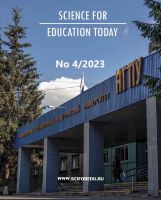Сравнение представлений студентов и преподавателей об эффективности системы подготовки будущих учителей к воспитанию школьников в цифровом образовательном пространстве
The system of preparing future teachers for providing moral education of schoolchildren within the digital learning environment: A comparative analysis of undergraduates and academics’ evaluative opinions
Author(s): Alla Fedorovna Matuszak, Olga Yuryevna Pavlova, Yulia Ablullovna Akhkamova, Daria Sergeevna Bespalova, Lubov Mikhailovna Lapshina, Elena Viktorovna Sheremetyeva, Vitaliy Sergeevich TsilitskySubject(s): School education, Educational Psychology, Sociology of Education, Distance learning / e-learning
Published by: Новосибирский государственный педагогический университет
Keywords: Moral education of school students; Digital learning environment; Teacher preparation system; Initial teacher education; Teacher education; Future teachers; Digital learning environment;
Summary/Abstract: Introduction. The article is devoted to the problem of preparing future teachers for providing moral education of school students within the digital learning environment. The purpose of the study is to compare the attitudes of academics, who are developing the system of preparing future teachers for providing moral education of school students within the digital learning environment with students’ opinions about the effectiveness of its components. Materials and Methods. The research follows the systemic, activity-based and personalityoriented methodological approaches. The systemic approach allows to study the preparation of future teachers for providing moral education of schoolchildren in the digital learning environment as a system. The activity-based approach makes it possible to identify specific types of activities within the system. The personality-oriented approach contributes to selecting the contents according to the interests of future teachers. In order to achieve the purpose of the study, the authors used theoretical (analysis of scholarly literature, analysis of university work experience, generalization) and empirical (ranking, survey, interview) research methods. Statistical data processing was conducted by means of the Mann-Whitney U-test. The sample consisted of Education undergraduates (n = 122), newly-qualified teachers (the graduates of the university) (n =10), and academics (n=40). Results. The results of the theoretical research demonstrate that preparation of future teachers for providing moral education of school students within the digital learning environment has systemic characteristics and is implemented in the process of studying education disciplines, work placements, independent learning, participation in extra-curricular activities organized by the university, their own school experience, information obtained from the Internet, and studying experience of teaching staff at schools. The research supports the opinion that transferring skills between learning environments is a complicated task. Consequently, targeted work is required on order to prepare future teachers for educating school students in the digital learning environment. In the process of empirical research, it was revealed that the most effective ways of teacher training today are work placements, education disciplines, and personal learning experience of prospective teachers. The authors emphasized that students consider traditional methods of preparation, for example, independent learning, to be more effective than obtaining information from the Internet, while the academics have the opposite point of view. The results of the study have proven that the balance between the real and digital environments is significant for effective teacher preparation. Conclusions. The article concludes that the system of teacher education should be supplemented by the electronic learning environment which comprises theoretical and practical issues of providing moral education of school students within the digital learning environment. The preferences of future teachers and academics largely coincide, that can contribute to the effectiveness of education. However, academics overestimate the theoretical component of the curriculum.
Journal: Science for Education Today
- Issue Year: 13/2023
- Issue No: 4
- Page Range: 7-29
- Page Count: 23
- Language: Russian

